新编大学英译汉教程-分译
新编大学英译汉教程-转译共21页文档

23、一切节省,归根到底都归结为时间的节省。——马克思 24、意志命运往往背道而驰,决心到最后会全部推倒。——莎士比亚
25、学习是劳动,是充满思想的劳动。——乌申斯基
新编大学英译汉教程-转译
16、人民应该为法律而战斗,就像为 了城墙 而战斗 一样。 ——赫 拉克利 特 17、人类对于不公正的行为加以指责 ,并非 因为他 们愿意 做出这 种行为 ,而是 惟恐自 己会成 为这种 行为的 牺牲者 。—— 柏拉图 18、制定法律法令,就是为了不让强 者做什 么事都 横行霸 道。— —奥维 德 19、法律是社会的习惯和思想的结晶 。—— 托·伍·威尔逊 20、人们嘴上挂着的法律,其真实含 义是财 富。— —爱献 生
谢谢!
新编英汉翻译教程5 Comparison between English and Chinese
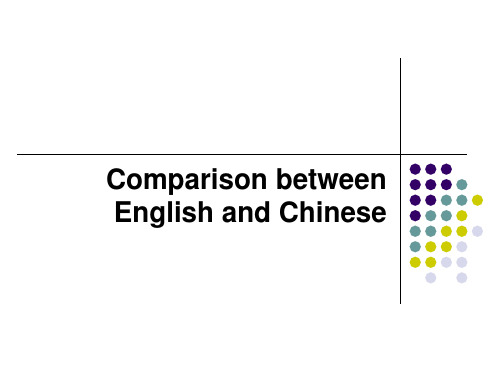
That is our policy and that is our declaration. —— W. Churchill 这就是我们的国策。这就是我们的宣言。
发展体育运动,增强人民体质。 Promote physical culture, and build up People’s health.
3. 普通人在办公处和家庭中使用电子计算机的时代 已经到来。 The time has come when ordinary people can use electronic computers both in the office and at home. 4. 学科技、学英语,对社会主义现代化建设很重要。 学科技、学英语,对社会主义现代化建设很重要。 It is important to study English as well as science and technology for our socialist modernization drive.
Ⅴ. Static vs. Dynamic
A mastery of Chinese and English is essential for E-C or C-E translation.
做英汉/汉英翻译必须掌握好汉语与英语。 做英汉 汉英翻译必须掌握好汉语与英语。 汉英翻译必须掌握好汉语与英语
The very sight of it makes me feel nervous. 一看到它,我就感到紧张。 一看到它,我就感到紧张。 I am sure of it. 对此我深信不疑。 对此我深信不疑。
Animate)
Ⅶ. Passive vs. Active Ⅷ. Indirect vs. Direct Ⅸ. Substitutive vs. Repetitive Ⅹ. Synthetic vs. Analytic
新编英语教程unit1,2,3,4,5,8,9,10,11课文翻译
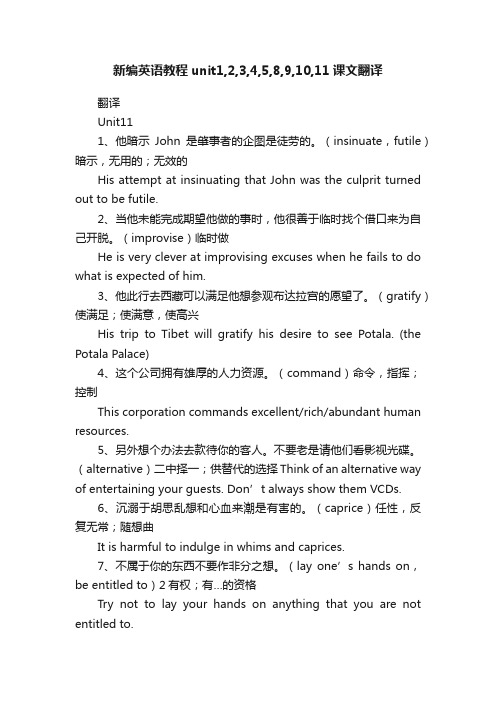
新编英语教程unit1,2,3,4,5,8,9,10,11课文翻译翻译Unit111、他暗示John是肇事者的企图是徒劳的。
(insinuate,futile)暗示,无用的;无效的His attempt at insinuating that John was the culprit turned out to be futile.2、当他未能完成期望他做的事时,他很善于临时找个借口来为自己开脱。
(improvise)临时做He is very clever at improvising excuses when he fails to do what is expected of him.3、他此行去西藏可以满足他想参观布达拉宫的愿望了。
(gratify)使满足;使满意,使高兴His trip to Tibet will gratify his desire to see Potala. (the Potala Palace)4、这个公司拥有雄厚的人力资源。
(command)命令,指挥;控制This corporation commands excellent/rich/abundant human resources.5、另外想个办法去款待你的客人。
不要老是请他们看影视光碟。
(alternative)二中择一;供替代的选择Think of an alternative way of entertaining your guests. Don’t always show them VCDs.6、沉溺于胡思乱想和心血来潮是有害的。
(caprice)任性,反复无常;随想曲It is harmful to indulge in whims and caprices.7、不属于你的东西不要作非分之想。
(lay one’s hands on,be entitled to)2有权;有…的资格Try not to lay your hands on anything that you are not entitled to.8、他没有来参加竞赛。
Unit 8 Romantic Stories新编大学英语第二版第一册课文翻译
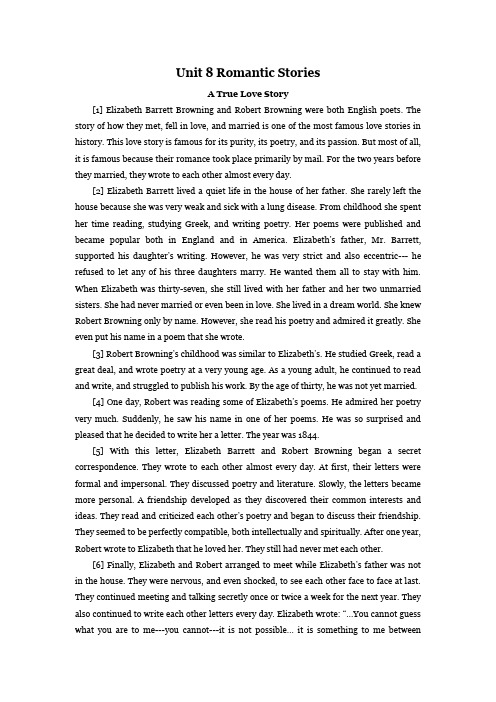
Unit 8 Romantic StoriesA True Love Story[1] Elizabeth Barrett Browning and Robert Browning were both English poets. The story of how they met, fell in love, and married is one of the most famous love stories in history. This love story is famous for its purity, its poetry, and its passion. But most of all, it is famous because their romance took place primarily by mail. For the two years before they married, they wrote to each other almost every day.[2] Elizabeth Barrett lived a quiet life in the house of her father. She rarely left the house because she was very weak and sick with a lung disease. From childhood she spent her time reading, studying Greek, and writing poetry. Her poems were published and became popular both in England and in America. Eli zabeth’s father, Mr. Barrett, supported his daughter’s writing. However, he was very strict and also eccentric--- he refused to let any of his three daughters marry. He wanted them all to stay with him. When Elizabeth was thirty-seven, she still lived with her father and her two unmarried sisters. She had never married or even been in love. She lived in a dream world. She knew Robert Browning only by name. However, she read his poetry and admired it greatly. She even put his name in a poem that she wrote.[3] Robert Browning’s childhood was similar to Elizabeth’s. He studied Greek, read a great deal, and wrote poetry at a very young age. As a young adult, he continued to read and write, and struggled to publish his work. By the age of thirty, he was not yet married.[4] One day, Robert was reading some of Elizabeth’s poems. He admired her poetry very much. Suddenly, he saw his name in one of her poems. He was so surprised and pleased that he decided to write her a letter. The year was 1844.[5] With this letter, Elizabeth Barrett and Robert Browning began a secret correspondence. They wrote to each other almost every day. At first, their letters were formal and impersonal. They discussed poetry and literature. Slowly, the letters became more personal. A friendship developed as they discovered their common interests and ideas. They read and criticized each other’s poetry and began to discuss their friendship. They seemed to be perfectly compatible, both intellectually and spiritually. After one year, Robert wrote to Elizabeth that he loved her. They still had never met each other.[6] Finally, Elizabeth and Robert arranged to meet while Elizabeth’s father was not in the house. They were nervous, and even shocked, to see each other face to face at last. They continued meeting and talking secretly once or twice a week for the next year. They also continued to write each other letters every day. Elizabeth wrote: “…You cannot guess what you are to me---you cannot---it is not possible… it is something to me betweendream and miracle.” Robert answered that he had never kept a journal before, but he had started one now. In it he wrote the date of every visit with her and how long it lasted. He even wrote the number of minutes they had been together and said that they added up to two full days in length.[7] Then, in September, 1846, in a secret marriage ceremony, Elizabeth Barrett became Elizabeth Barrett Browning. A week later, without telling Elizabeth’s father, the happy couple eloped to Italy. The shock was terrible for Mr. Barrett, but his anger could not diminish their happiness. In 1849, they succeeded in having a son. They lived in Italy, extremely happy, for fifteen years, until Elizabeth’s death in 1861.一个真实的爱情故事1 伊丽莎白·巴雷特·勃郎宁和罗伯特·勃郎宁都是英国诗人。
(完整版)Unit2ThePowerofWords新编大学英语第二版第四册课文翻译
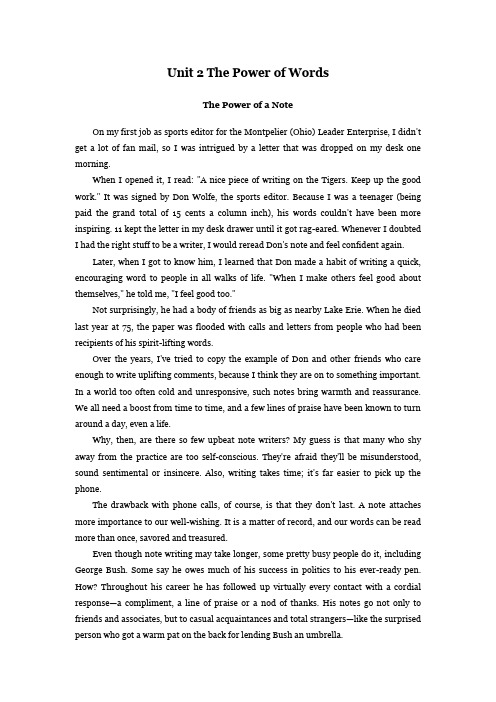
Unit 2 The Power of WordsThe Power of a NoteOn my first job as sports editor for the Montpelier (Ohio) Leader Enterprise, I didn't get a lot of fan mail, so I was intrigued by a letter that was dropped on my desk one morning.When I opened it, I read: "A nice piece of writing on the Tigers. Keep up the good work." It was signed by Don Wolfe, the sports editor. Because I was a teenager (being paid the grand total of 15 cents a column inch), his words couldn't have been more inspiring. 11 kept the letter in my desk drawer until it got rag-eared. Whenever I doubted I had the right stuff to be a writer, I would reread Don's note and feel confident again.Later, when I got to know him, I learned that Don made a habit of writing a quick, encouraging word to people in all walks of life. "When I make others feel good about themselves," he told me, "I feel good too."Not surprisingly, he had a body of friends as big as nearby Lake Erie. When he died last year at 75, the paper was flooded with calls and letters from people who had been recipients of his spirit-lifting words.Over the years, I've tried to copy the example of Don and other friends who care enough to write uplifting comments, because I think they are on to something important. In a world too often cold and unresponsive, such notes bring warmth and reassurance. We all need a boost from time to time, and a few lines of praise have been known to turn around a day, even a life.Why, then, are there so few upbeat note writers? My guess is that many who shy away from the practice are too self-conscious. They're afraid they'll be misunderstood, sound sentimental or insincere. Also, writing takes time; it's far easier to pick up the phone.The drawback with phone calls, of course, is that they don't last. A note attaches more importance to our well-wishing. It is a matter of record, and our words can be read more than once, savored and treasured.Even though note writing may take longer, some pretty busy people do it, including George Bush. Some say he owes much of his success in politics to his ever-ready pen. How? Throughout his career he has followed up virtually every contact with a cordial response—a compliment, a line of praise or a nod of thanks. His notes go not only to friends and associates, but to casual acquaintances and total strangers—like the surprised person who got a warm pat on the back for lending Bush an umbrella.Even top corporate managers, who have mostly affected styles of leadership that can be characterized only as tough, cold and aloof, have begun to learn the lesson, and earn the benefits, of writing notes that lift people up. Former Ford chairman Donald Peterson, who is largely credited for turning the company round in the 1980s, made it a practice to write positive messages to associates every day. "I'd just scribble them on a memo pad or the corner of a letter and pass them along," he says. "The most important ten minutes of your day are those you spend doing something to boost the people who work for you."Too often," he observed, "people we genuinely like have no idea how we feel about them. Too often we think, I haven't said anything critical; why do I have to say something positive? We forget that human beings need positive reinforcement—in fact, we thrive on it!"What does it take to write letters that lift spirits and warm hearts? Only a willingness to express our appreciation. The most successful practitioners include what I call the four "S's" of note writing.1) They are sincere. No one wants false praise.2) They are usually short. If you can't say what you want to say in three sentences, you're probably straining3) They are specific. Complimenting a business colleague by telling him "good speech" is too vague; "great story about Warren Buffet's investment strategy" is precise.4) They are spontaneous. This gives them the freshness and enthusiasm that will linger in the reader's mind long afterward.It's difficult to be spontaneous when you have to hunt for letter-writing materials, so I keep paper, envelopes and stamps close at hand, even when I travel. Fancy stationery isn't necessary; it's the thought that counts.So, who around you deserves a note of thanks or approval? A neighbor, your librarian, a relative, your mayor, your mate, a teacher, your doctor? You don't need to be poetic. If you need a reason, look for a milestone, the anniversary of a special event you shared, or a birthday or holiday. For the last 25 years, for example, I've prepared an annual Christmas letter for long-distance friends, and I often add a handwritten word of thanks or congratulations. Acknowledging some success or good fortune that has happened during the year seems particularly appropriate considering the spirit of the Christmas season.Be generous with your praise. Superlatives like "greatest," "smartest," "prettiest" make us all feel good. Even if your praise is a little ahead of reality, remember that expectations are often the parents of dreams fulfilled.Today I got a warm, complimentary letter from my old boss and mentor, Norman Vincent Peale. His little note to me was full of uplifting phrases, and it sent me to my typewriter to compose a few overdue letters of my own. I don't know if they will make anybody else's day, but they made mine. As my friend Don Wolfe said, making others feel good about themselves makes me feel good too.便笺的力量1 我当体育编辑,最早是为蒙比利埃(俄亥俄州)的《企业导报》工作,当时我很少收到体育迷的来信。
新编英汉翻译教程
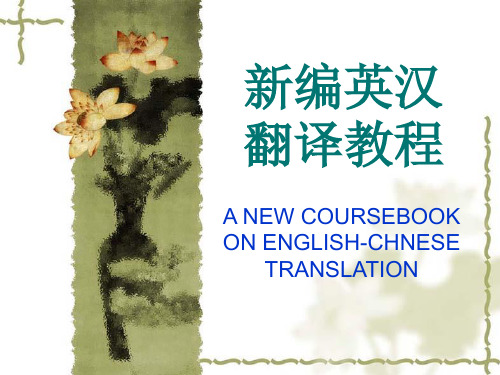
“我知道,爸,”她说,“我是个自私鬼。我会考虑这个问题的……”
二.归化法(domesticating method)
一.归化的目的是力求译文通顺易懂,能为译语读者所接受。 EXAMPLE:
1.She could not desert Tara;she belonged to the red acres far more than they could ever belong to her.(M.Mitchell:Gone with the wind,p.20)
二.采取异化译法,不仅可以充分地传达原作的“异国风味”,而且可以引用 一些原语的S “瓶颈”(bottleneck) 2.“猫哭老鼠”VS “洒鳄鱼泪”(shed crocodile tears) 3.“全副武装”VS “武装到牙齿”(be armed to the teeth) 4.Say no (to) “否定,拒绝,反对” EXAMPLE: They said a sharp no to our propsals.他们断然拒绝我们的建议。 They dare say no to the superpower!他们敢于反对那个超级大国。VS 他们敢对那个超级大国说不!
异化法的限度:一是译语语言文化的限度,二是译语读者接受能力的限度。
三.伪异化
1.Consequently Mr.Micawber was soon so overcome,that he mingled his tears with hers and mine.(C.Dickens: David Copperfield,Ch.12) 结果米考博先生不久就伤感的把他的眼泪同她的和我的混合起来了。 (P) Mingle their tears “一起哭” 结果是,一会儿米考博先生也受不住了,和她和我,眼泪对流了起来。 2.“I know,Dad,”she said,“I’m a selfish Pig.I’ll think about it…”(J.Galsworthy:A Modern Comedy,p.47) “我知道,爹,”她说,“我是头自私自利的猪。我会考虑这个问题 的……”(P)
新编英语教程课文翻译
新编英语教程课文翻译 Last updated on the afternoon of January 3, 2021第1单元避免两词铭记两词在生活中,没有什么比顿悟更令人激动和兴奋的,它可以改变一个人——不仅仅是改变,而且变得更好。
当然,这种顿悟是很罕见的,但仍然可以发生在我们所有人身上。
它有时来自一本书,一个说教或一行诗歌,有时也来自一个朋友。
在曼哈顿一个寒冷的冬天的下午,我坐在一个法国小餐馆,倍感失落和压抑。
因为几次误算,在我生命中一个至关重要的项目就这样落空了。
就因为这样,甚至连期望看到一个老朋友(我常常私下亲切的想到的一个老人)的情形都不像以前那样令我兴奋。
我坐在桌边,皱起眉头看着色彩多样的桌布,清醒的嚼着苦涩的食物。
他穿过街道,裹着旧棉袄,一顶帽子从光头打下来,看上去不像是一个有名的精神病医生,倒像是一个精力充沛的侏儒。
他的办公室在附近到处都有,我知道他刚刚离开他最后一个病人。
他接近80岁,但仍然扛着一个装着满满文件的公文包,工作起来仍然像一个大公司的主管,无论何时有空,他都仍然爱去高尔夫球场。
当他走过来坐我旁边时,服务员早已把他总是要喝的啤酒端了过来,我已经几个月没有见他了,但他似乎还是老样子。
没有任何寒暄,他就问我“怎么了,年轻人?”我已经不再对他的样子感到奇怪,所以我详细地把烦恼告诉他。
带着一丝忧伤的自豪。
我尽量说出实情,除了我自己,我并没有因为失望而责备任何人。
我分析了整件事情,但所有负面评价以及错误仍然继续。
我讲了约有十五分钟,这期间老人只是默默的喝着啤酒。
我讲完后,他取下眼镜说:“到我的办公室去。
”“到你的办公室你忘了带什么了吗”他和蔼的说“不是,我想看看你对某些事情的反应,仅此而已。
”外面开始下起小雨,但他的办公室很温暖,舒服,亲切:放满书的书架靠着墙壁,长皮沙发,弗洛伊德的亲笔签名照,还有墙边放着的录音笔。
他的秘书回家了,只有我们在那里。
老人从纸盒里拿出一盘磁带放进录音笔,然后说:“这里有到我这来求助的三个人的简单录音,当然,这没有说明具体是哪三个人。
新编英语教程第三版4第一章翻译
AmbitionPerri Klass[Lead in][1] In college, my friend Beth was very ambitious, not only for herself but for her friends. She was interested in foreign relations, in travel, in going to law school. “I plan to be Secretary of State someday,”she would say matter-of-factly. One mutual friend was studying literature, planning to go to graduate school; he would be the Chairman of the Yale English department. Another friend was interested in political journalism and would somedayedit Time magazine. I was a biology major. And I was interested in writing fiction. we were all smart-ass (自作聪明的滑头) college freshmen, pretending the world was ours. We were smart college freshmen, and why should we limit our ambitions?在大学, 我的朋友贝丝是非常有野心的, 不仅为自己, 也为她的朋友。
她对外交关系、旅行、去法学院感兴趣。
"我计划有朝一日成为国务卿," 她说得很实事求是。
我们一个共同的朋友在学习文学, 计划去研究生院;他将成为耶鲁大学英语系的系主任。
新编汉英翻译教程__第六章
新生词汇层出不穷:
• 南水angtze River to North China
• 胡子工程-----long drawn-out project • 内转外-----export products and technologies
originally targeted at the domestic market • 豆腐渣工程-----beancurd projects; jelly-built
Department
中国------the State Council
新闻翻译具有很强的政治性和导向性
e.g. 在有关台湾问题的新闻报道中经常提到 要 “统一”台湾, 这里的“统一”的适当译 法是reunification, 指重新统一本来就属于中 国的台湾。如果使用unification一词, 其潜 台词就变成了中国要首次统一台湾, 亦即台 湾本来是一个独立的主权国家, 也就违背了 中国政府关于台湾问题的一贯立场。
project • 农业要搞 “一优两高”-----attention should be
paid to high yields, better quality and greater efficiency in agriculture
新生词汇层出不穷:
• 人员分流---reposition of redundant personnel
新闻中的句子翻译
• 汉语句子的信息结构多为主位-述位结构, 而英语句子往往是主语-谓语结构。此外, 汉语的主位与述位之间少有衔接成分, 主 要借助语义和语境形成意义的贯通;英 语讲究句法结构的完整, 需使用衔接成分 以显示句子的结构关系。在英译新闻文 本时, 译者应对汉语的结构进行转换, 并 在适当的位置添加必要的衔接部分。
新编英语教程3翻译
1.他们都认为他成功的可能性很小。
They had thought his chances of landing the job were slim.2.我不知道她为何总带有一中闷闷不乐的神情。
I wonder why there is always an air of sadness in her.3.等到所有同学都就座后,学生会主席才开始宣布野营的日程安排。
It was after all the students had taken their seats that the president of the students’ union proceeded to announce the camping itinerary.4.胃是人体至关重要的器官,请善待之。
The stomach is a vital organ of the human body; please take good care of it.5.他认为总经理如此重视那些日常琐事是荒唐的。
He considered it was ridiculous for the general manager to attach so much importance to daily routines.6.根据安排,全体工作人员依次值晚班。
According to the arrangement, all the members of the staff take turns to be on night watch.7.她的研究涉及到多种语言和文化,富有挑战性。
Her study, which ranged over many languages and cultures, was full of challenge.8.想到要远离父母独立生活,她深感不安。
She felt dismayed at the thought of leaving away from her parents on her own.9.对于她是否胜任这项工作我们不甚担心,我们所担忧的确实她的健康状况。
- 1、下载文档前请自行甄别文档内容的完整性,平台不提供额外的编辑、内容补充、找答案等附加服务。
- 2、"仅部分预览"的文档,不可在线预览部分如存在完整性等问题,可反馈申请退款(可完整预览的文档不适用该条件!)。
- 3、如文档侵犯您的权益,请联系客服反馈,我们会尽快为您处理(人工客服工作时间:9:00-18:30)。
不定式短语分译
(1)To find the hottest and coldest parts of the solar system on Mercury is quite strange. 译:人们发现太阳系中最冷处和最热处都在 水星上,这是颇为奇怪的。 (2)Several theories of atomic structure were produced when the electron(电子) was discovered,only to be discarded when more information about the atom was obtained. 译:发现电子之后提出了几种原子结构学说, 随着资料增多,都被抛弃了。
并列复合句的分译
(1)The recruitment of Chinese labor was not universally accepted in the racially conscious 19th century America and some white workers unsettled(使心神不宁) by their appearance in large numbers. 译:在种族意识十分强烈的19世纪的美国,招 募中国劳工的做法并非普遍为人们所接受。由 于工地上出现大批中国劳工,某些白人工人感 到心绪不宁。(在连词and处切分)
(2)Friday night,in my New Jersey family,was"bowling(保龄球) night",and I sitll recall once asking my mom if we could go out for pizza one Friday. 译:在我们新泽西州的家里,每周星期五晚上是 “保龄球之夜”。我仍记得有一次,我问妈妈我 们能不能哪个周五去吃比萨饼。(在连词and处 切分) (3)NEC(日本电气公司) says it has designed the robot 5 to be "cute".It can doze off(打瞌睡)and talks in its sleep,and will start dancing and playing music if it is patted. 译:日本电气公司称已设计出一种小巧可爱的机 器人5号。它会打瞌睡,说梦话。要是你拍它一 下,它便开始跳舞和演奏音乐。(在and前切分)
短语分译是指把原文中的一个短语分 译成一个句子。通常名词短语、不定式 短语、分词短语、介词短语等都可以分 译成句。
2、短语分译
名词短语分译
(1)I'd always welcomed the friendly sound of my brother's voice calling from Maryland,but this time his words jolted(使 震惊) me as I stood with the kitchen phone to my ear. 译:我一直非常喜欢接到远在马里兰州的弟弟打 来的电话,他的声音是那么亲切。然而这一次我 站在厨房里接到他电话的时候,他的话却让我惊 讶不已。
(2)At present people have a tendency to choose the safety of the middleground reply. 译:现在,人们都倾向于采取不偏不倚的 态度来回答问题,因为它安全,不招风险。 (3)As a secret training base for a new plane,it was an excellent site,its remoteness effectively masking its activity. 译:作为新型飞机的秘密训练基地它是很 理想的:地处边陲,不易发现。
副词分译
(1)The Chinese seemed justifiably (justifiable有道理的,有理由的) proud of their economic achievement. 译:中国人似乎为他们经济上取得的成就而 自豪,这是合乎情理的。 (2)This is a NATO matter and any comment on it should appropriately come from NATO. 译:这是北约组织的问题,关于这个问题的 任何意见,都应由北约组织发表,这才是适 宜的。
(2)The addition of manganese(锰)to steel produces a fine grain(颗粒) substance which has greater toughness(韧 性) an ductility(延展性). 译:钢中加锰可形成细晶粒物质,这种物质有更 好的韧性和塑性。(在which引导的从句处切分) (3)This shining flowerpot holder stood importantly in the west window of the parlor (客厅),where it caught the late-afternoon sun and sent brilliant circles of light spilling (溢出,流出) onto the walls and ceiling. 译:那只光亮的花盆托盘放在客厅西窗窗台上, 十分显眼。下午稍晚的时候,阳光照在花盆托盘 上,花盆托盘就把耀眼的光圈投射到四周的墙壁 和天花板上。(在where引导的从句前切分)
(2)I found the whole family assembled(聚 集) when I arrived;they were sitting in the great old kitchen with its stone foolr,Mrs Meadows in her usual chair by the fire,very upright(正直的,笔直的),and I was amused to see that she had put on her best silk dress,while her son and his wife sat at the table with their children. 译:我到达时,发现他们一家人聚在一起。他们 坐在铺着石块地板的又大又旧的厨房里。梅多斯 夫人坐在她经常坐的那把火炉边的椅子上,腰板 子挺直。我饶有兴趣地发现她穿上了她最好的真 丝衣衫。她的儿子,儿媳与他们的孩子们一起坐 在桌子前边。(原文含有并列句、从属从句等)
长句的分译
(1)Manufacturing(制造,生产) process may be classified as unit production(单件 生产) with small quantities being made and mass production(批量生产) with large numbers of identical(相同的)parts being produced. 译:制造过程可分为单件生产和批量生产。单 件生产指少量的生产,批量生产指大量相同零 为简单句的分译、并列复合 句的分译、主从复合句的分译及长句的分译。
简单句的分译
(1)His wealth enables him to do everything. 译:他有钱,什么事都能干。 (2)This rare and fabulous bird is unique. 译:该鸟系珍稀禽类,天下无双。 (3)His contemptuous(轻蔑的) attitude towards us is contemptible(可鄙的). 译:他以蔑视的态度对待我们,这种态度是可鄙的。
分译
bruce
英语句子的修饰语既多且长,句子结构复 杂,特别是长句,宛如“参天大树、枝叶横 生”;而汉语句子的修饰语则较少且短,句子 结构呈直线型发展,宛如“万顷碧波,层层推 进”。因此,英译汉时不可亦步亦趋、死译硬 译,而必须根据汉语的表达特点,灵活处理。 分译就是一种常用的灵活处理方法。所谓分译 就是指根据汉语的句法特点,把英语的句子分 解成两个或两个以上的单位,以求译文在正确 传达原文的思想内容的前提下明白晓畅。分译 通常包括单词分译、短语分译和句子分译三种 情况。 分译的原则:分形不分意
主从复合句分译
(1)And all this was done in the heart of a crowded city with very little storage space,so that the arrival of each part had to be scheduled to the minute,and the construction work so organized that there was no delay and no one got in another's way. 译:一切都在某个拥挤的城市中进行。贮料空 间非常小,所以每次进料的时间分秒不差;工 地进度也是如此,不容拖延,互不相碍。
1、单词分译
英语的个别单词令译者棘手,若单独 照译,翻译腔十足;若不译出,又损原意。 此时,要依照句意,译成一个小句。采用 单词分译是为了句法上的需要,也是为了 修饰上的需要,如加强语气,突出重点等。 能分译成句的单词,多为副词和形容词, 动词和名词有时也可以分译。
名词分译
(1)It was morning,and the new sun sparkled gold across the ripples(涟漪, 波纹) of the gentle sea. 译:清晨,初升的太阳照着平静的海面,微 波荡漾,闪耀着金色的光芒。
形容词分译
(1)Amelia Sedley is a pretty,gentle and unintelligent creature. 译:艾米莉亚· 赛德利人虽漂亮温顺,但天 资却不高。
(2)Alchemists(炼金术士) made resultless efforts to transform one metal into another. 译:炼金术士试图把一种金属变为另一种金 属,完全是徒劳。
